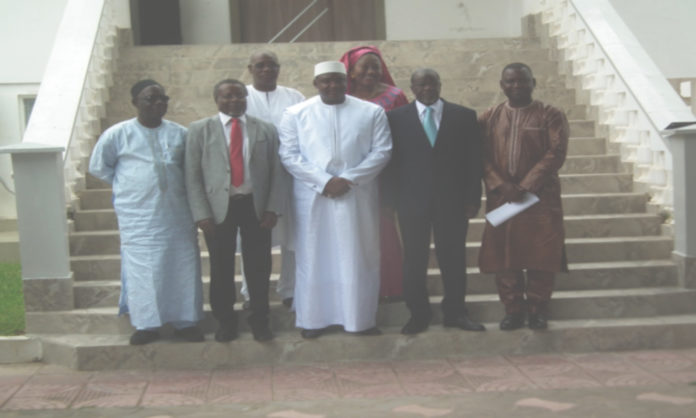By Awa B. Bah
Members of the Land Commission were on Monday 17 September 2018 sworn in ceremony held at statehouse in Banjul. Following the nomination made by the president, the designation of chairman by the Chief Justice and nominations by the minister of lands and regional government as provided in section 5 subsection (3) of the Land Commission Act 2017. A five person Commission comprising Justice Raymond Sock as chairperson, Buba Barry, Nancy Nyang, Momodou S. Jobe, and Kemo Conteh as members.
What became apparent from the statements delivered is that the Commission is not a court and will not deal with cases already dealt with by a court. It is an advisory body empowered to investigate land disputes and can look into the root cause of a dispute.
Justice Raymond Sock Chairperson of the Commission said the importance of the Land Commission is sufficiently reflected in its functions under section 14 of the Act. They are to advise the Minister of Lands and Regional Government on policy matters relating to land administration with a view to ensuring strict adherence to those policies in transparency in land allocations; to investigate disputes on land ownership and occupation in any area in The Gambia; to assess land rent and premium of properties; to monitor the registration of properties and inspect land registers and records; to be responsible for all matters relating to boundaries including monitoring and reporting to the Minister of Lands and Regional Government and other functions that may be assigned to the Commission by the Minister.
These functions he said are no doubt with profound impacts on every Gambian and the nation as a whole, requiring the concerted efforts and cooperation of all to ensure that the problems of land and land allocations are mitigated and that land administration is recognised in the Gambia. In the execution of its functions, he said, the Land Commission will seek the assistance of other relevant institutions and persons with requisite expertise. The Commission he said is empowered under the Act to appoint such technical and other committees as it deems necessary.
He said the Commission is empowered to conduct investigations of land disputes concerning ownership and occupation in any area in the Gambia. The operative work of the Commission he said are investigations and that the mandate of the commission regarding disputes does not extend to the resolution of land disputes. The Commission he said is not an adjudicating body and does not have judicial powers but is established under the Act as a body corporate which may sue or be sued. The provisions in the Act regarding legal proceedings against the Commission, the determination of tittle to land between contesting parties he said are within the purview of the judicial bodies with jurisdiction over such matters. He said that he believed the commission’s investigative role in land disputes is to focus on the root causes of the disputes with a view to advising the minister on possible measures to mitigate them and prevent reoccurrence.
He assured that the Commission will execute its functions under the Act conscientiously and without fear or favour.
The Minister for Lands and Regional Government said the Land Commission is in fulfillment of the constitutional requirement and most importantly the desire and commitment of the government of The Gambia to address land and land related problems. He expressed government’s desire to resolve land and land related problems and setting up this Commission is a clear manifestation of this government’s commitment to swiftly address the concerns of its citizens.
He said that his ministry with other line stakeholders will always be available in any way possible towards the attainment of the Commission’s objectives. He urged Commissioners to expedite the functions bestowed on them and submit their findings and recommendations in the shortest time. He added that the government is committed to ensuring that our customs and traditions are maintained.
The President, Adama Barrow, noted that his government will continue to established structures in various institutions to strengthen the governance system. The good governance processes, he said, includes working with structures at the decentralized levels under the Ministry of Lands and Regional Government. Acknowledging the challenges of land and land related issues they face, today a Commission is established that will look into challenges in the administrations of land in the Gambia.
He stressed that the Commission is not an appeal court and will not handle cases already handled by the courts. The former government he said abused the lives of citizens and many communities lost their lands and properties for political or dubious reason. He urged commissioners to guide the Gambia in land and land administration. Governance he said is a process and that every generation faces its own challenges.


















